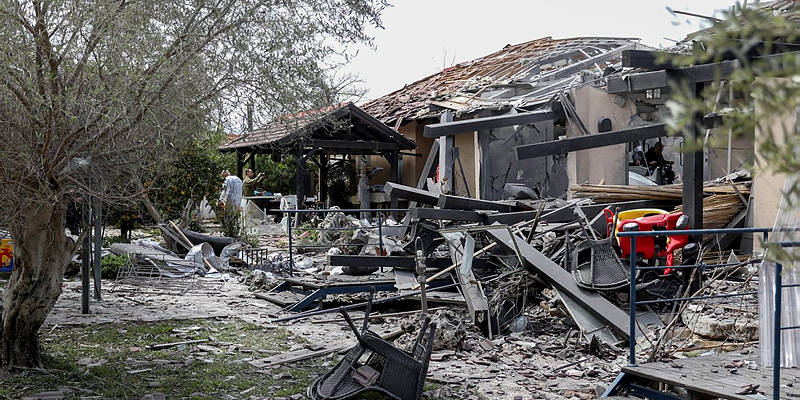The Financial Times’ attempt to paint Gaza’s fanatical, violent, Jew-hating cult as reasonable and rational political actors victimised by Israeli aggression represents a moral inversion of staggering proportions.
By Adam Levick, CAMERA-UK
A Feb. 6th Financial Times article by their Jerusalem correspondent Mehul Srivastava reported on the recent decision by the ICC that the court has jurisdiction to open an investigation into alleged war crimes by Israel and Hamas.
Whilst there are quite a few problematic claims in the article (“International court sets stage for trial over 2014 Gaza war crime claims”), the following background on Hamas stood out as one of the most grossly misleading characterisations of Hamas that we’ve come across:
“Hamas has controlled the Gaza Strip since a violent coup against the Palestinian Authority in 2006, and Israel and Egypt have since placed the territory under an unrelenting blockade that has destroyed its economy and largely trapped a population of 2m people within a strip of land about 25 miles long.
“The militant group, which has widespread support both in Gaza and the West Bank, regularly fires short-range missiles and highly unreliable projectiles into Israel to add pressure in contentious negotiations over how much electricity it shall receive, the distance Gazan fishermen can venture out to sea and other ways to relieve the blockade.”
Let’s break this down:
Hamas is ‘Widely Popular’
First, contrary to the reporter’s claim (which didn’t include a source), Hamas most certainly does not have “widespread support in both Gaza and the West Bank [Judea and Samaria].”
The most recent polling (December 2020) in the West Bank and Gaza by the widely respected Palestinian polling organization ‘Palestinian Center for POLICY and SURVEY RESEARCH’ revealed that if presidential and legislative elections were held today, 38% would vote for Fatah, whilst 34% would vote for Hamas. Even in Gaza, only 43% say they would vote for Hamas. In the West Bank, 26% would vote for Hamas. (The rest would vote for other parties)
Pollsters noted that these results are similar to polling they’ve conducted over the past six months.
So, it’s unclear on what evidence the FT reporter based his assertion.
Further, it would be hard for reporters on the ground (like Srivastava) to assess Hamas’s popularity based on speaking to Gaza residents, because the group’s rule over Gaza is authoritarian, and protests against the regime – or dissent of any kind – aren’t tolerated. A rare example of spontaneous uprisings against the Islamist group’s rule occurred in 2019, only to be met with a violent Hamas crackdown on the hundreds of non-violent protesters.
Hamas ‘Fires Short-ranged, Highly Unreliable Projectiles’
The fact is that Hamas, which has fired more than 15,000 rockets and mortars towards Israeli civilian communities since Israel withdrew from the territory in 2005, has an increasingly sophisticated arsenal that includes rockets able to reach most of Israel’s major population centers, including Tel Aviv and Jerusalem.
The rocket attacks have terrorized Israeli communities along the Gaza envelope, killed dozens of civilians, wounded hundreds and have sent millions into bomb shelters.
Here’s a partial list of Hamas’s rocket arsenal:
– M-75: A long-range rocket produced by Hamas in Gaza that can reach Jerusalem and Tel Aviv. The rocket is based on technology from Iran, and has a maximum range of 70 to 75 kilometers (43 to 47 miles) and carries a 10-kilogram warhead.
– J-80: A long-range rocket manufactured by Hamas that can reach the Tel Aviv area, the southern Sharon region and Jerusalem. It has a maximum range of 100 kilometers and a 20-kilogram warhead.
– WS-1E: An upgraded version of the Grad rocket that is made in China and is capable of reaching Ashdod and Be’er Sheva. Its maximum range is said to be 40 kilometers. Its warhead weighs between 18 and 22 kilograms.
– Fajr: An Iranian-made rocket that has two models: Fajr 3 with a maximum range of 40 kilometers and a 45-kilogram warhead; and Fajr 5 with a maximum range of 75 kilometers and a 90-kilogram warhead.
– M-302 (Khaibar) A Syrian-made, Iranian-supplied rocket with several versions – with a maximum range of 90-200 kilometers and warheads ranging from 125-170 kilograms.
– R-160 A long-range rocket produced by Hamas with a range of 160 kilometers.
– Sejjil-55 A rocket with a maximum range of 55-kilometers and a 10-kilogram warhead.
Their inventory of projectiles does include a lot of short-range, inaccurate rockets, but terror groups in Gaza are constantly trying to improve their arsenal to include more of the longer-range, sophisticated rockets mentioned above. Israel’s blockade is of course designed limit the terror group’s acquisition of more accurate and deadly weapons – which brings us to the next FT claim:
Re assertion that Hamas fires rockets at Israel merely to “add pressure” to Israel to “relieve the blockade”:
This assertion almost reads like a statement by the Hamas ministry of propaganda.
Hamas is an internationally proscribed terrorist group committed to Israel destruction and the mass murder of Jews. Regardless of whatever short-term tactical goals they may also have, they fire rockets at Israel for one primary reason: to kill as many Israelis as possible. The fact that they’re usually not successful certainly isn’t due to a lack of desire.
The framing by the FT turns reality on its head, just as the failure of journalists like Srivastava to impute agency to Palestinians means that they are unable to reach the most intuitive and logical conclusions about cause and effect.
Israel’s blockade (which restricts military items and ‘dual use’ items from entering the strip) is of course a response to Hamas’s decision to launch rocket attacks at Israeli cities, build attack tunnels, and engage in other methods of terror. If Hamas were to change their behavior, and cease threatening Israel’s population, the result would be Jerusalem’s loosening of the blockade.
The Financial Times’ attempt to paint Gaza’s fanatical, violent, Jew-hating cult as reasonable and rational political actors victimised by Israeli aggression represents a moral inversion of staggering proportions.
Editor’s Note: We complained to FT editors about their claim over Hamas’s alleged “widespread popularity.” The complaint was dismissed, so we appealed to the news outlet’s complaints commissioner.
Bring Joy to Israeli Soldiers - Send Winter Care Packages!
We are honored to thank the young men and women of the IDF who risk their lives every day to defend the citizens of Israel.
Join us in sending winter care packages and personal notes of support to Israeli soldiers who are out in the cold all day.
Warm up a soldier's heart with essential winter wear including fleece jackets, hats, gloves and more. Keep an entire unit warm!
THE SOLDIERS REALLY APPRECIATE YOUR LOVE AND CONCERN!
Click Here to Send Your Gift and Personal Note to Israeli Soldiers

